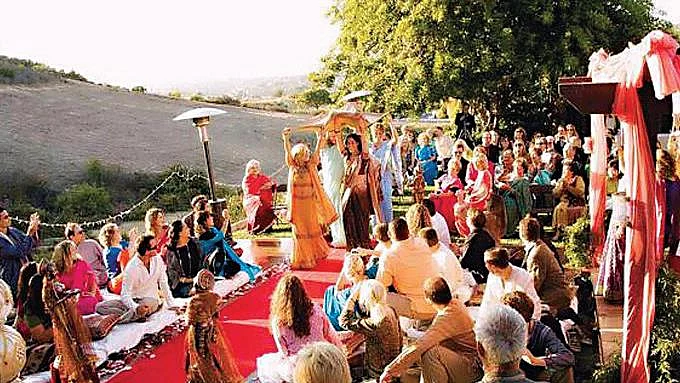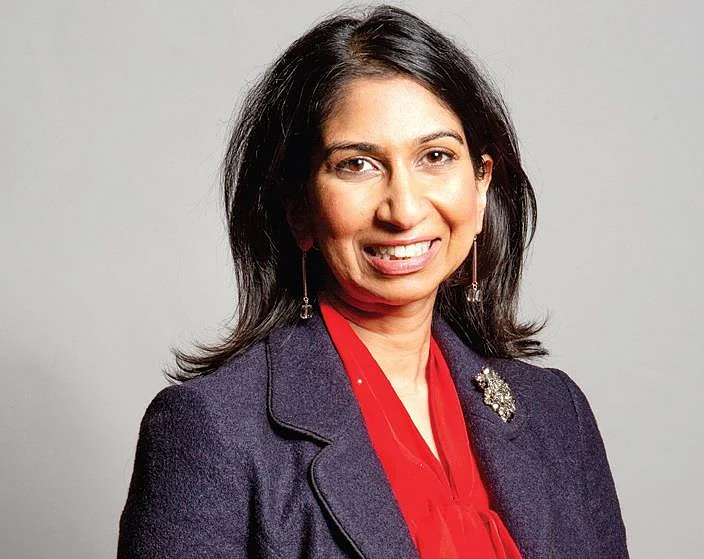London Diary: Indian wedding goes global
‘You haven’t been to India, until you’ve been to an Indian wedding,’ reads the tagline of a tourism firm, reportedly thriving by pairing India-bound tourists with Indian couples set to get married

If anyone reading this is planning a big fat Indian wedding—you know the sort of extravaganza that goes on forever with Bollywood music blaring and scotch on tap—you can earn some hard cash in foreign currency, thanks to a boom in what’s called ‘experience tourism’ where foreign travellers to India are encouraged to ‘experience’ the country instead of just seeing it.
And what can be a more exotic experience for a tourist from a cold and damp European country than a warm, heart-throbbing Indian wedding?
‘You haven’t been to India, until you’ve been to an Indian wedding,’ reads the catchy tagline of a tourism firm, reportedly thriving by pairing India-bound tourists, including gap-year students, with Indian couples set to get married. Join My Wedding advertises itself as a ‘unique platform which lets you invite foreign travellers that are interested in really getting to know the Indian culture to your wedding’. It is aimed at the kind of traveller who “seeks out genuine cultural experiences”.
“If you’re seeking to broaden your horizons, then a traditional Indian wedding should be at the top of your list. It’s the place where all the elements of a culture collide in one, huge, unstaged celebration,” according to its founder, Orsi Parkanyi.
This is how it works: couples register their weddings on the website, upload a photograph and information for international guests about the fees and days they are invited.
They also include a short write-up of their ‘relationship story’, whether it is an arranged marriage or a love match. Most Indian couples who register tend to be in their 20s, and from less conservative families. The going rate is between £120 and £250 per head to attend one or more days. The majority of the fee is retained by the couple.
The website is full of breathless testimonials from both the paying guests and hosts. ‘It was the coolest thing I did in India. The food, the people, the culture—you get everything!’ says an Austrian guest.
Urvi Ambavat and Paras Sah, a wedding couple from Mumbai, write: ‘My family couldn’t wait to meet our special guests on the big day and explain all the beautiful Indian wedding traditions to them.’ Any takers?
--
London versus New York
The famous rivalry between London and Paris is now passe. It’s now London versus New York, with many New Yorkers moving across the pond to settle in the British capital, apparently drawn by its cultural vibrancy, green spaces and good schools, apart from better job opportunities.
Lately, a number of American celebrities have moved to London. This represents a reversal of the 1990s trend that saw several high-profile figures such as Salman Rushdie move to New York complaining of London’s ‘bitchy’ literary scene.
The latest New York celebrity shifting to London is Canada-born writer and former Vanity Fair editor, Graydon Carter. “London has both energy and civility. New York still has energy but less civility. I know you all think it’s dirty, but I would eat off the streets here compared with New York, which is just filthy. This city (London) is now more glamorous,” he told a British newspaper.
About New Yorkers’ famed contempt for British food, he said: “Until the 1970s, everything was boiled. But now London and New York are the greatest food cities in the world, particularly London. You have the best of French, Italian, American; London even has some of the greatest burgers now.”
Say cheese, and welcome to London.
--
Sunak’s losing fight
Rishi Sunak’s desperate struggle to survive the existential threat to his political future from a resurgent Opposition Labour party is best illustrated by his decision to draft in former PM David Cameron, the man to whose ouster he contributed as an ardent Brexiteer.
Sunak believes Cameron can give his image a makeover as an inclusive centrist leader. But opportunistic quick fixes are no substitute for a coherent strategy, say his Tory party colleagues.
Senior party figures acknowledge Sunak’s excellent work ethic, but say he is “fundamentally failing as a leader because nobody knows what he stands for”, The Times reported. And this before his very public falling out with his toxic former home secretary, Suella Braverman, who he sacked over her incendiary rhetoric over immigration and pro-Palestinian protests.
--

Going rogue, Braverman style
As an example of political hypocrisy, this nugget about Suella Braverman unearthed by Tory peer and former leader of the commons, Lord George Young, is in a league of its own.
According to Parliamentary records, in her maiden speech as MP, Braverman committed herself to “tolerance and fellowship” towards immigrants, hoped that Britain’s union with the European Union would remain a happy marriage, and ended by promising to serve with “humility, integrity and warmth”.
Within months, she had turned into a hardline Brexiteer calling for Britain’s withdrawal from the EU, and has since become an anti-immigrant hawk. As for “humility, integrity and warmth”? What’s that?
And, finally, the new foreign secretary, David Cameron, was prevented from entering the parliament house tea room because he is not an MP. A doorkeeper noticed he wasn’t wearing a pass denoting either a current or former membership, and told him off. No ID, no tea, even if you claim to be the foreign secretary.
Follow us on: Facebook, Twitter, Google News, Instagram
Join our official telegram channel (@nationalherald) and stay updated with the latest headlines
